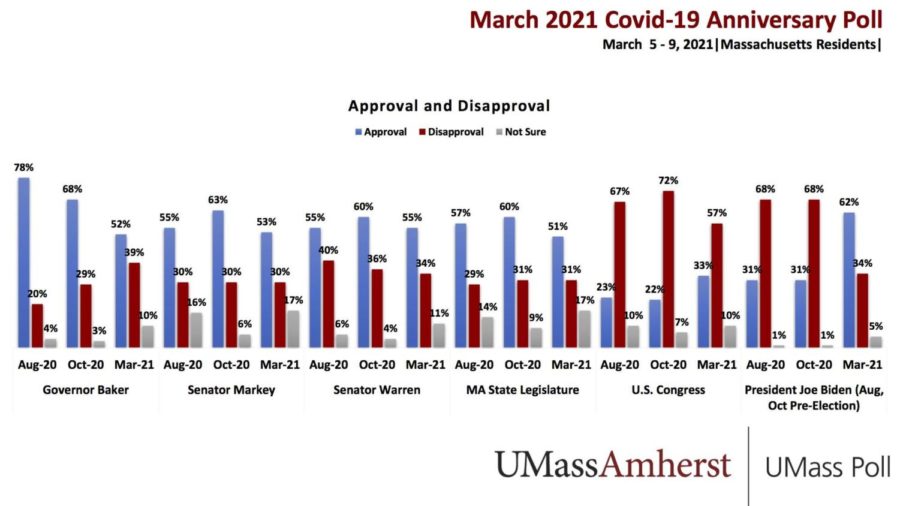The UMass Poll, run by the University of Massachusetts department of political science, has been conducting polls for Massachusetts, New England on national politics since 2010. Directed by Professor Tatishe Nteta, the Poll “combines cutting edge online polling with academic and professional expertise in the science of politics,” according to their website.
“The goal is to add to our understanding of public opinion,” said Professor Alexander Theodoridis, an associate director of the Poll.
“We need to provide policy makers and the public with information that helps good government,” said Professor Ray LaRaja, another associate director of the Poll. The Poll is currently staffed by Nteta, LaRaja, Theodoridis and political science department Chair Jesse Rhodes.
The Poll was started in 2006 by former Professor Brian Schaffner. According to Nteta, the original Poll sought to explore public opinion using survey research. Nteta wanted to design “a poll that can be a leader in the region about how people are thinking about politics.”
His hope came true, as the group soon became influential in polling, with Theodoridis citing it as one of the things that drew him to UMass. Theodoridis explained that the Poll has “the ability to conduct super high quality public opinion research.”
“We all come together and put the poll together […] but each of us brings different areas of expertise and research interests,” Theodoridis explained. He described how his focus is on “partisanship, polarization, campaigns, and elections,” while Nteta described his focus being “race and ethnic politics.” LaRaja explained his perspective as being “less interested in the horserace, but more interested in the policy interests of the people of Massachusetts.”
According to their website, the Poll relies on a polling firm called YouGov.
“YouGov relies on cutting edge statistical techniques to recruit survey respondents online and produce a representative sample of the target population,” the Poll’s methodology section said.
The UMass Poll has helped explain data in numerous elections, including Senate, gubernatorial and presidential primaries. According to their website, the Poll’s results have been featured in prominent local, state and national media outlets, including WGBH, WBZ Radio and News, The Boston Globe, MSNBC, Politico, CNN and the Washington Post.
According to Nteta, the UMass Poll was “one of the first polls that had Markey flipped,” referring to the Ed Markey’s race against Joe Kennedy III in the 2020 Senate primary. Kennedy had been leading in the polls until a late surge by incumbent Markey, who would go on to win the primary and the general election in November.
The 2020 election in Massachusetts also produced a surprise with regards to rank choice voting. According to a CNNPolitics article, rank choice voting “lets voters literally rank their choices in order of preference, marking candidates as their first, second and third choice picks.”
According to LaRaja, they expected that voters would like rank choice voting, because “it had a lot of potential to give voters more choices.” Instead, 55 percent of Massachusetts voters rejected the initiative according to a WBUR report.
“Voters weren’t really enthusiastic about it,” LaRaja explained. “It made me realize that voters don’t always pay attention to process questions. Reformers need to do a better job informing the public,” he said.
The Poll had success in 2016 as well. The Poll notes that “locally, YouGov and UMass Poll produced one of the most accurate polls in the closing days of the 2016 Massachusetts general election.”
For example, the Poll accurately claimed that 54 percent of the state supported the legalization of marijuana, which later passed on election day with 54 percent of residents supporting the initiative.
Additionally, the UMass Poll strives to engage with national politics. Nteta explained that the Poll seeks to “inform and educate at the national level.” Following the 2020 presidential election, Theodoridis explained that “80 percent of respondents were afraid of post-election violence.”
Voters’ concerns would later be confirmed by the Jan. 6 insurrection at the U.S. Capitol building where five died and numerous were injured. The rioters were attempting to overturn the election results naming now President Joe Biden beating former President Donald Trump.
The Poll is now seeking to expand polling’s ability to show “how people view politics and elections,” Nteta said. He explained that the Poll wants to inform, educate and make people aware in the future about polling on public opinion.
The Poll is also planning on working more with undergraduate students. Faculty involved in the Poll currently teach multiple courses in the political science department, including political polling and survey research, public opinion and political psychology.
Alex Genovese can be reached at [email protected]. Follow him on Twitter @alex_genovese1.




















